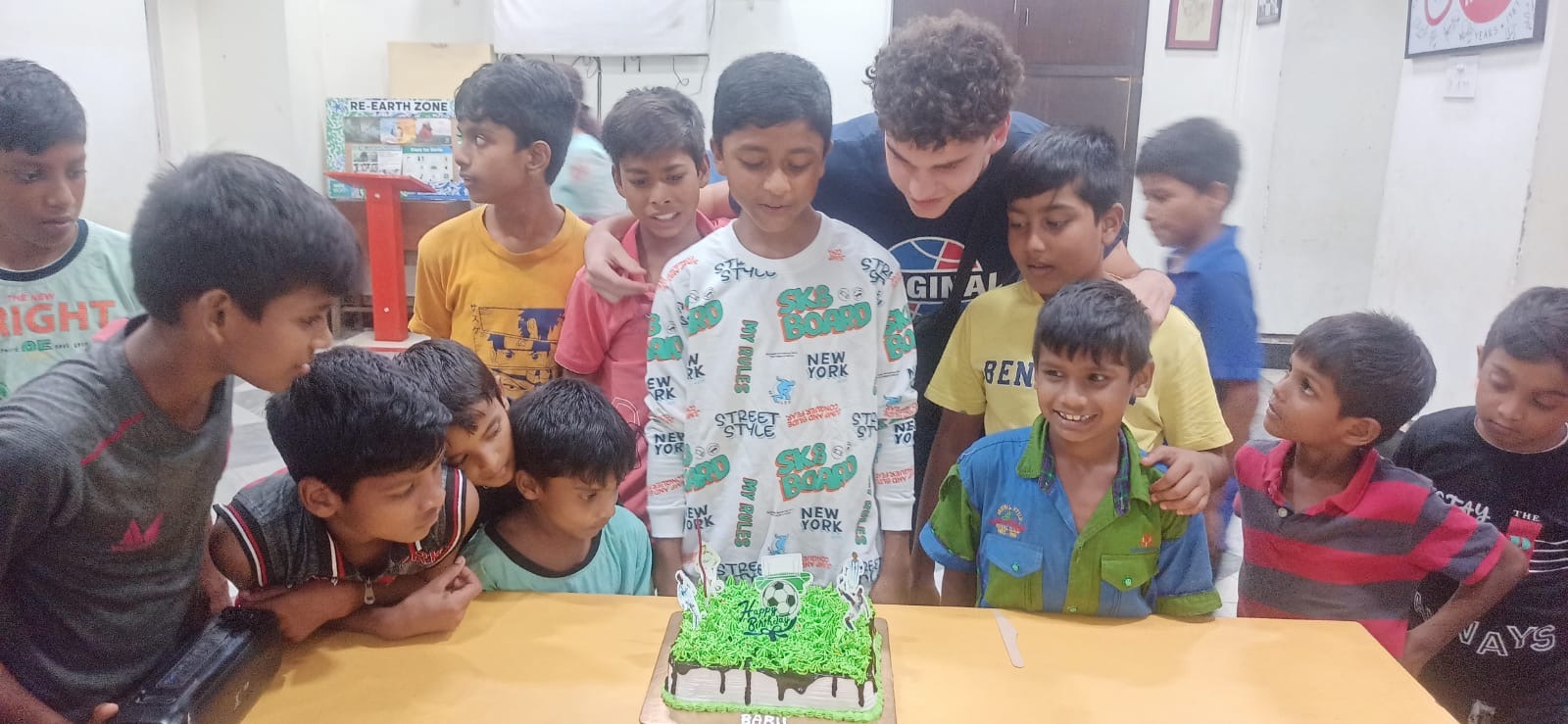Volunteering in Kolkata - Part 2
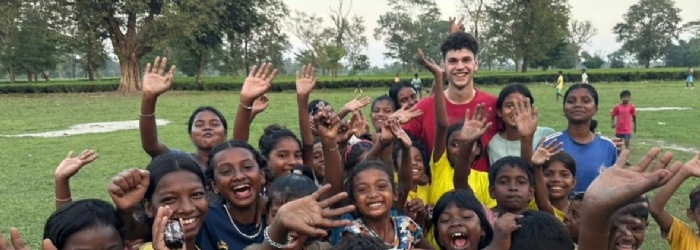
One of our recent leavers, Emil (DO25), is spending the first six months of his gap year in Kolkata volunteering with Future Hope, a local charity that helps street children escape poverty through education, medical care, and providing homes. Emil wrote about his experience settling into the Future Hope community last month, which you can read by clicking here, and he has now sent us an update on what he has been doing since. Over the past few weeks, he has joined the Future Hope rugby team in a national tournament in Mumbai, travelled to North Bengal to help run rugby sessions for children in remote villages, and launched regular music lessons and clubs at the school. Now well settled, Emil divides his time between teaching, coaching, and supporting students in the boarding houses, continuing to make a real difference to the young people of Future Hope.
From Kolkata to Mumbai
October began with the Future Hope school holidays (Durga Puja), which gave me just about enough time to breathe before… boarding a 40-hour train to Mumbai to take part in the national rugby tournament - despite not having played in ages!
I travelled with the Future Hope team (who play in the Harlequin colours), though, most of the players are not current students. Many are connected to the wider community: some now work in the school, and others joined from outside. What unites nearly all of them is having grown up in difficult backgrounds, often in Kolkata’s slums, where rugby first entered their lives through the outreach projects of an organisation named Khelo Rugby.
Khelo Rugby began with the simplest idea: gather children in vulnerable communities, encourage them to play, give them a meal afterwards, and hope they return to play again and fall in love with this great team game. Many did, at first, for the food (which some described as “something we never imagined eating”), but over time, sport became a path to belonging, discipline, confidence and opportunity. Some players have since represented their state or even national team, and rugby has become a big part of their identity. So, although we were technically just a rugby team travelling across India, it felt like being part of something much bigger.
The train journey itself was an experience. Trying to sleep on a hard bunk amidst constant noise, questionable hygiene, snoring, and vendors repeatedly chanting “CHAI, CHAI, PANI!” from 4am onwards. Despite that, it was unforgettable - not only discovering how vast India truly is (1,902km from Kolkata to Mumbai) but also forming close friendships with the team.
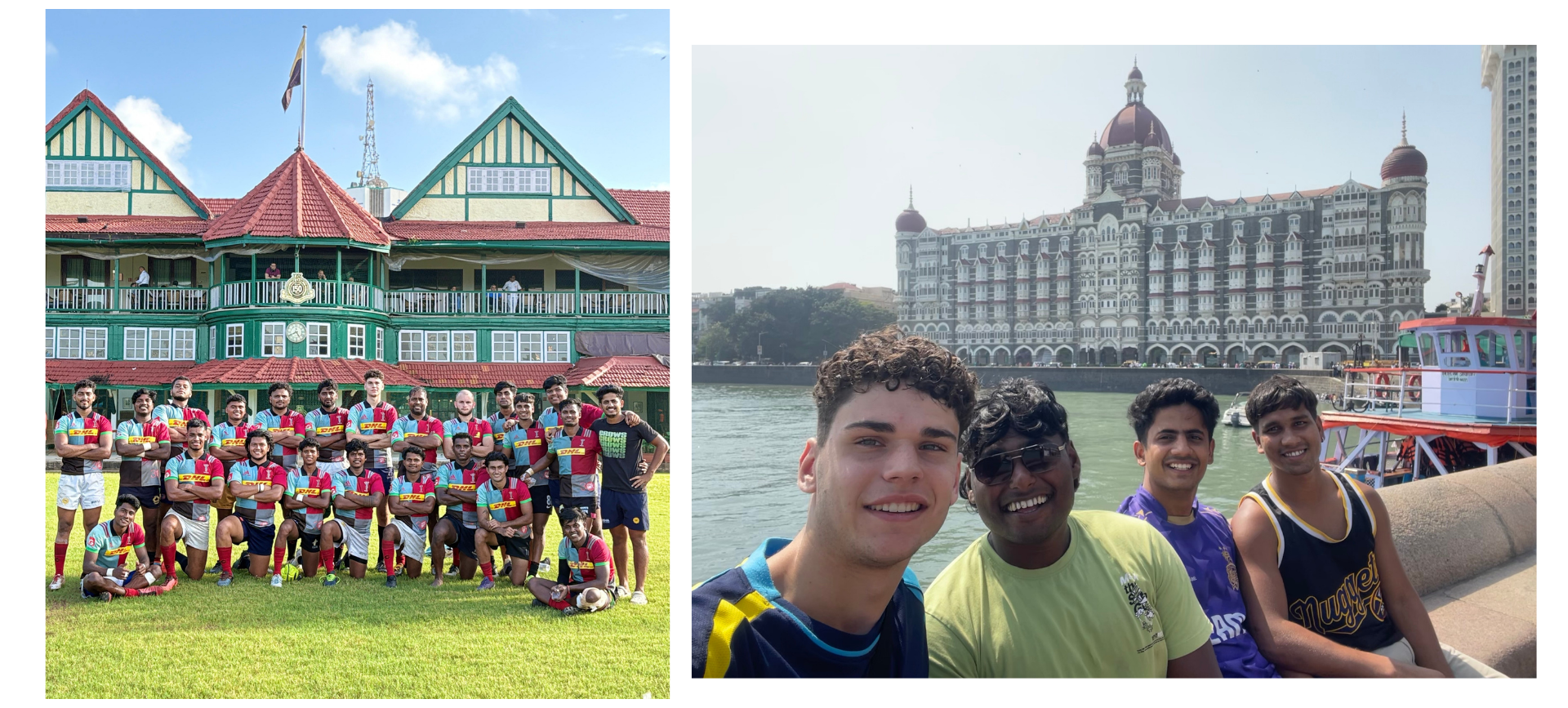
Saraswatipur
After Mumbai, I joined a few players on a trip to Saraswatipur, a remote village near Siliguri in North Bengal where Khelo Rugby runs one of its key projects. The contrast from the city was striking: beautiful tea gardens, bamboo homes raised from the ground to guard against elephant attacks, clay stoves glowing beneath dinner pots, and a peaceful distance from the noise and pollution of Kolkata. The hospitality was deeply moving - every home visit meant being seated, served chai and food, and gently but firmly discouraged from leaving too soon. Knowing the challenges these families face made their kindness even more heartfelt.
We helped run rugby sessions for local children and supported a girls’ tournament. What impressed me most wasn’t just their skill or enthusiasm, but how profoundly this sport has reshaped lives here. In villages where boys can drift (with risk of alcoholism etc) whilst girls are expected to stay home or work in tea gardens, Khelo offers an alternative path built on teamwork, joy, and aspiration. Many players from this village have gone on to represent the state and even the nation.
I did struggle to communicate with the locals - their English was limited, and my Hindi, Bengali, Sadri, Kurukh, and Nepali are still (!) non-existent but their warmth bridged the language gap.
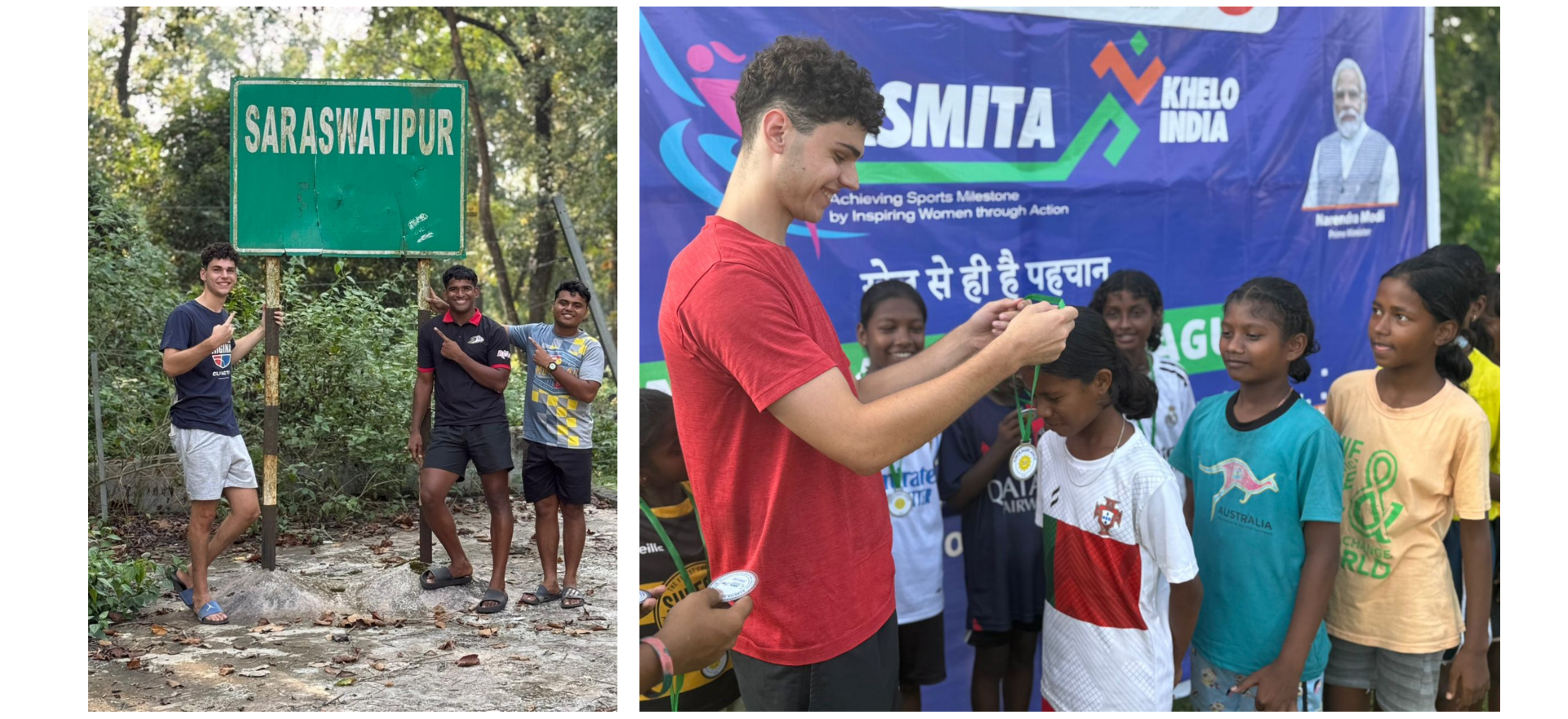
Back to Kolkata
Returning to Kolkata felt rather anticlimactic after all that travelling and adventure, but I was nevertheless excited to pick things up again and push forward with a few projects at the school. My routine is now well established. Mornings begin with assembly, followed by time in the Resource Room supporting students with varied learning difficulties and neurodiverse needs who benefit from closer individual attention. Progress is slow but meaningful, even something as small as reading a word correctly can feel like a triumph. I have also launched official music lessons a few times a week, and we’re now preparing for our upcoming music competition in December. While I still assist in some regular classes, most of my focus remains in the Resource Room, where I feel I’m most needed.
Around the same time, the city was celebrating Diwali, which meant constant fireworks, noise, and light everywhere, impressive at first, though slightly alarming when I saw children as young as six handling them! Shortly after, I somehow found myself at a Muslim wedding with a couple of friends. Despite not knowing the bride, groom, or anyone else there, we were treated like guests of honour and fed like kings.
In the afternoons, I run a music club which, in theory, is for one or two interested students at a time. In practice, about ten turn up, crowd around one piano, play every combination of notes imaginable, and sing entirely different songs at the same time. Despite the chaos, some are now beginning to grasp chord structures and can play simple songs more independently, which is incredibly rewarding. The interest in music has really grown, even outside the afternoon club, students often stop me during the day to ask about a chord or a song they’re trying to learn. It’s lovely seeing their curiosity spill into the rest of the school day. I also play in the weekly music assembly and hope to gradually involve some of the growing musicians.
Cricket season has begun, and I have wisely developed a habit of arriving thirty minutes late to avoid the brutal warm-ups with the reasonable excuse of “teaching music lessons.” I have also started helping with rugby coaching at the morning academy session held on the school grounds and sometimes play hockey with some of the girl boarders in the afternoons - a fun change of pace and an effective way to continue building relationships outside the classroom.
Evenings are spent in the boys’ boarding house, where relationships have further developed as I find out more about their lives and how they tick.
This is lovely, though occasionally exhausting, as I seem to have become both older brother and at times portable climbing frame. Their energy is constant but so is their affection, and I am grateful to be a part of their lives. I have also started helping in the middle boys’ boarding house (ages 14–16), helping with homework and simply spending time with them.
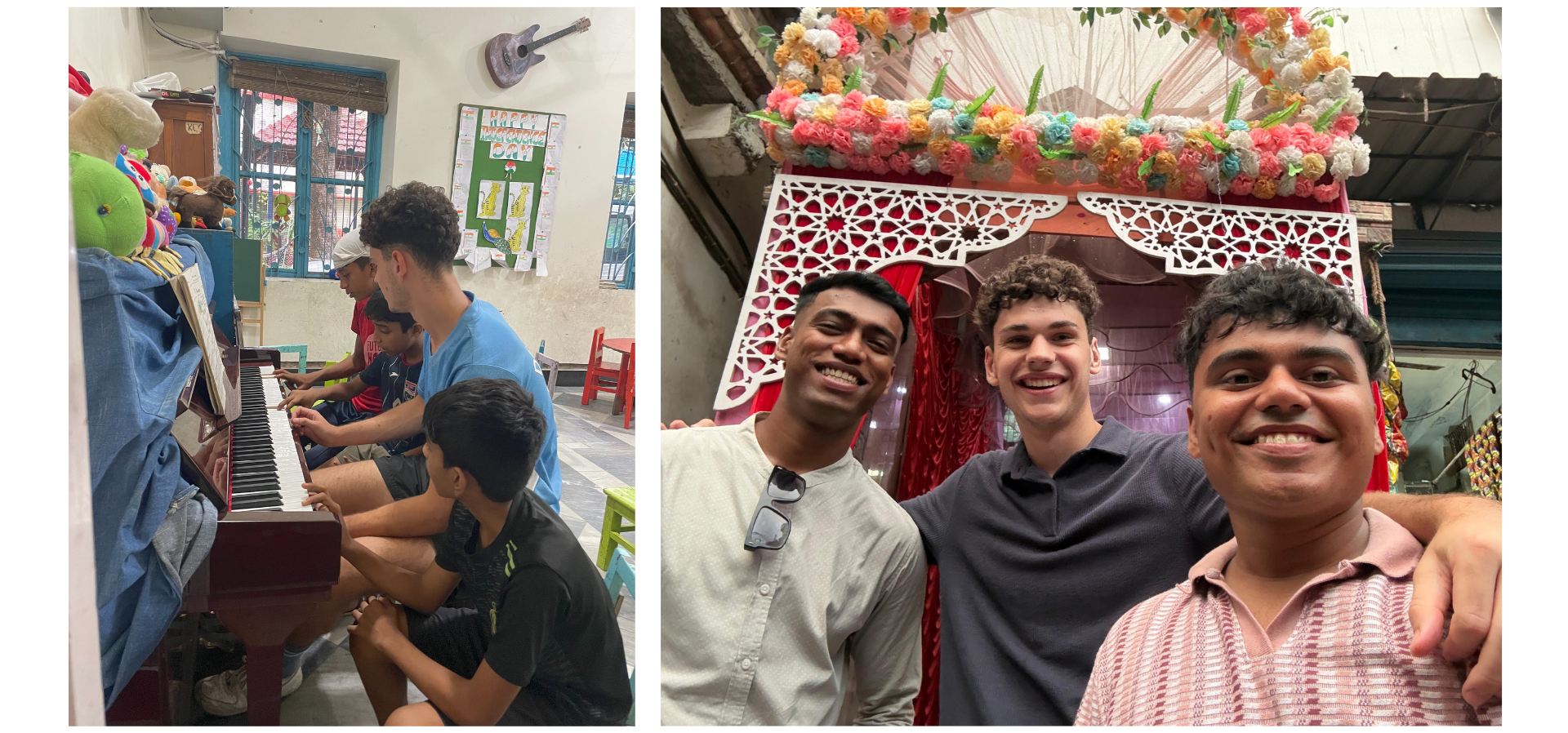
Reflections and Looking Ahead
I have realised that I occupy a tricky in-between role: not a student, yet not a teacher either. It sometimes makes social situations hard to judge, and I am still learning how best to balance friendliness with boundaries. Even so, my responsibilities now feel clearer, the pace has quickened, and expectations - both of me and from me - have risen. It can be tiring, unpredictable, and occasionally overwhelming, but each day is teaching me to be patient, adaptable, and intentional about encouraging confidence in young people - whether through helping solve fractions, teaching a chord progression, or simply being consistently present.
Looking ahead, I hope to create more structured music sessions, begin mentoring senior students preparing for exams, and develop the singing group into something performance-ready for December’s music festival (even if no one quite knows how it will work yet)
Thank you again for your support. Every moment continues to remind me how meaningful - and hopefully transformative - this experience is for the students, and for me.
Best wishes,
Emil
